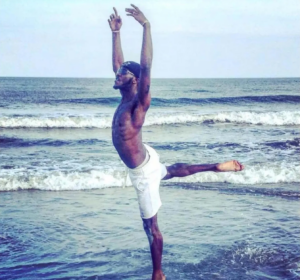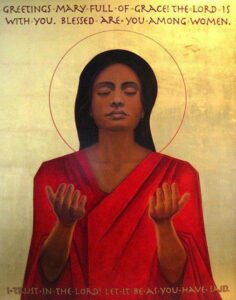May God who is Majesty, Mercy, and Mystery speak words of life, love, and liberation through these words. Amen.
Today’s readings press the claim that God saves. God saved Joseph from certain death in the first lesson through his older brother Ruben. The psalm celebrates the God who saves and dramatically retells a bit of Joseph’s story. In the epistle, Paul bends scripture into a pretzel and rewrites its meaning, combining passages from Deuteronomy, Leviticus, Joel and Isaiah to create an entirely new text about about Jesus and salvation in his name. And in the gospel, Jesus saves Peter when Peter’s faith is not enough to save himself. God saves. Jesus saves. Jesus saves because he is the love of God in woman-born flesh, the flesh of the Ever Blessed Virgin Mary who we commemorate today. It is that love of God that gives birth to the mercy of God and saves us from ourselves and the evil we do or have had done to us. That is the sermon the framers of this lectionary probably intended me to preach. It’s a good one. But there are perhaps a thousand other sermon possibilities woven through these readings from stories and characters that are overlooked. And I’ve got a little time left so you’re going to get another sermon and just maybe, they’ll turn out to be the same one.
 Sometimes the focus on salvation means we focus on the end of the story without considering the journey. We who are saved by the love of God poured into the womb of the Blessed Virgin and God’s love poured out on the bloody cross of a supremacist empire, we are on a journey. Sometimes, even with the certain hope of salvation and resurrection and reunification with all our loved ones and the saints of God, we are on a journey that is at turns painful and perilous between moments of delight and seasons of joy. And we, or at least I, need some help on the journey other than, “Jesus saves.” Those are powerful and comforting words. But they can also be twisted into a trite expression and become an excuse for not dealing with the very real struggle and pain we all experience on our journey, walking the way of love in a wicked and broken world doing its best to break us too. So for all of you who need more than “Jesus saves” on a t-shirt when your journey is taking you places you don’t want to go and subjecting you to trauma you did not choose, this sermon is for you. And for you whose journey has been so smooth you can see yourself cruising to the end in relative comfort, this word is also for you because you are not on your journey alone; we are all in this life together.
Sometimes the focus on salvation means we focus on the end of the story without considering the journey. We who are saved by the love of God poured into the womb of the Blessed Virgin and God’s love poured out on the bloody cross of a supremacist empire, we are on a journey. Sometimes, even with the certain hope of salvation and resurrection and reunification with all our loved ones and the saints of God, we are on a journey that is at turns painful and perilous between moments of delight and seasons of joy. And we, or at least I, need some help on the journey other than, “Jesus saves.” Those are powerful and comforting words. But they can also be twisted into a trite expression and become an excuse for not dealing with the very real struggle and pain we all experience on our journey, walking the way of love in a wicked and broken world doing its best to break us too. So for all of you who need more than “Jesus saves” on a t-shirt when your journey is taking you places you don’t want to go and subjecting you to trauma you did not choose, this sermon is for you. And for you whose journey has been so smooth you can see yourself cruising to the end in relative comfort, this word is also for you because you are not on your journey alone; we are all in this life together.
So we return to the story of Joseph. The text tells us that Israel, formerly Jacob, loved Joseph more than any of his other children because he was the child of his old age. Perhaps he also held him so dearly because he was at long last the child of his beloved Rachel for whom he stayed, laboring, for the hope and promise of marrying. He loved her so much that he worked seven years of manual labor and found they passed overnight because of his love and longing. Yet, between the desperate fertility of his first wife Leah – to whom he was tricked into marrying along with another seven years of manual labor – and, the enslaved women she and her sister Rachel gave him to impregnate and, finally Rachel herself, Israel had eleven sons and some unknown number of daughters with the birth of Joseph. All of them knowing their father loved little Joseph more than he would ever love any of them. It seems Israel learned nothing from having his love manipulated by his father-in-law. Or, perhaps he learned all the wrong lessons.
As a result, his children’s hunger for their father’s love was a hunger that could never be satisfied. The brothers turned mean and bitter and dangerous. The sisters, Dinah and whoever else was hidden in the text without a name, were ignored by their father in the story that never once speaks of a father’s love for a daughter yet, they show up to comfort their father in his inconsolable grief over the son he loved more than them in a verse I would have included if I had put together these lectionary readings (Genesis 37:35): All his daughters and all his sons rose up to comfort him but he refused to be comforted, and said, “For I shall descend to my son, mourning, on the way to Sheol.” Thus Joseph’s father wept for him.
Joseph was the baby even though he was no longer the baby; his beloved mother, Rachel, died giving birth to his baby brother, Benjamin. And perhaps because Benjamin would always be linked with the loss of his favorite wife, Israel continued to favor Joseph. All of this and the earlier conflicts over Joseph’s self-promoting dreams along with the tattle telling set up of the first reading may sound like the sibling rivalry with which any of us could have grown up and, perhaps did. But there was something uglier in this family. These hurts ran and deep and long like they do in some of our families.
That one boy was treated as treasure. His daddy gave him – and just him – a richly embroidered tunic with lavish sleeves that would come to be known as the garments worn by the daughters of kings. Four hundred years later as the story goes, Tamar and her sisters, King David’s daughters, wore them as well. Yes, Joseph wore a princess dress – and in his queer story there are a number of indicators that he was queer as well – including his father having to adopt his children because it was not credible that he fathered the children his wife gave birth to; but that’s another sermon. Like many who stand out in some visible way, like trans children and queer folk, Joseph was the victim of bullying, bullying that was not child’s play. Bullying is dangerous. Bullying can be lethal. Bullying can take and destroy lives – whether it is queer kids taking their own lives or others taking the lives of queer and trans folk because they think they shouldn’t exist, shouldn’t have joy or shouldn’t dance in public like O’Shae Sibley. Joseph’s brothers planned to kill him. Someone made the suggestion and eight full grown men agreed. Only one dissented.
Joseph was where they did not want him to be, where they did not think he belonged. Some folk still think that is justification for killing a person as Black folk know too well. True, Joseph was no prince no matter the outcome of his story or whatever that Technicolor musical or cartoon movie taught you while miseducating you. However, a person does not have to be a prince or a perfect child for them to be be worthy of the life God gave them. Joseph, O’Shae Sibley and every murdered black trans woman was and is the beloved of God and worthy of salvation in her eyes. And no one has the right to take their life away or – hold them in bondage.
It is incredibly dangerous that enslavement is set up as being salvific and beneficial in this story. That lie was fed to my ancestors for 400 years. Then it was Christians peddling christofascist white supremacist mendacious theological rationales for enslaving Africans for our benefit and civilization, never mind the profit they would accrue from our stolen labor, broken, tortured and raped bodies. And some folk are still peddling it; I’ve heard it in my time among you all right here. But now it is the Florida fascist in chief force feeding children the lie of “beneficial skills acquired during enslavement.” There is no benefit to enslavement, not baptism, not survival skills, not adoption of western cultural norms and attire, nothing — not one thing. The gospel of the enslaved proclaims, “before I’d be a slave I would be buried in my grave and go home to my God and be free.”
When we arrive at this episode, Joseph is 17, fully a man in his culture and these ten of his brothers are older than he. These are men, not boys. But they carry the unhealed hurts of childhood into their adulthood. And the hurt, harm and havoc they will wreak will bear the failure of their adult responsibility to manage their own pain without making it someone else’s. Their acts will not be childish pranks; they will be crimes: assault, kidnapping, trafficking, conspiracy to commit murder. This is not a children’s Bible story; we do great harm minimizing this domestic, family violence.
And platitudes about the love of God or the saving power of God or the power of her Name are simply not enough. It’s not enough for a child or teen who has been brutalized by someone in their family. It’s not enough for a girl child who has been sold to traffickers by her mother. It’s not enough for abused children watching one of their parents look away from the signs of their abuse. It is not enough to say, “Jesus saves” and perhaps point to miracles of scripture like the Peter story in today’s gospel. But rather, we are called to be Ruben and to be better than Ruben. We are not called to walk out on the water to save someone else but we are called to risk floundering in the treacherous depths of family feuds, broken relationships, cultural biases and assumptions to save the vulnerable from those who would harm them or tell them that their bondage is their salvation.
As the spiritual sung by my enslaved ancestors says, Joseph is a motherless child, a long way from home. In my sanctified imagination, I see him in his terror crying for his mama like so many black men murdered by the police, like Jesus on his cross. His father is far away and his brothers have become his would be murderers and traffickers. He has no one but God and God is slow walking his liberation. We need to be honest about that because many of us share that experience with Joseph; God is slow walking us to our freedom from a traumatic circumstance we did not chose. So many readers and preachers are quick to point out that Joseph’s experience of slavery wasn’t so bad. After all, he was eventually sold to the pharaoh. And his dreams that his brother’s blamed for their hatred of him brought him to prominence, promotion and elevation. Today, some might say that Joseph learned “beneficial skills” while he was enslaved and in prison. People have been romanticizing, misrepresenting and normalizing slavery for a long time while denying or minimalizing its horrors. As is common for most trafficked and enslaved persons, Joseph was sexually assaulted. He escaped the intended conclusion of the assault but he would not escape the trauma. That would have followed him for the rest of his life and he lived in a culture in which that would’ve been shameful for a man to acknowledge. Unfortunately that shame endures in our culture as well.
Joseph would be “saved.” But to be saved means not simply to be delivered from death or danger; it means to be made whole and to be restored and to be healed. When we tell of the saving power of God, of the salvation offered in the name of Jesus that Paul preached so creatively about, do we talk about saving a person’s mind and heart and spirit along with saving their soul? – (I said “creatively” because today Paul would’ve flunked preaching and biblical interpretation because of the way he took other people’s work and rewriting it until it meant something they did not or would not say.)
On this day that we also commemorate the Blessed Virgin, she offers us a model of the salvation that requires the saying “yes” to God even when the question doesn’t make sense in the world as we know it. Salvation is modeled by Mary the Mother of God and indeed, the entirety of the Hebrew Scriptures where it is not about individuals in isolation, the personal salvation of so many evangelicals and protestants. Indeed, the pinnacle of the Joseph story is that he is, in spite of and not because of, the horrific means, in place to save his people in a time of famine. But Joseph’s view of salvation was still too narrow. He identified with his enslaver so much that he took the Egyptian people for everything they had when they were hungry to enrich his master and he, he set up the very system of slavery that would be turned against and imprison his own people in the Exodus stories to follow.
The holy Virgin offers her body and eventually the life of her child to save the whole world from the hate and hurt capitalized on by systems of oppression and domination to enslave the world to fear and fear of death. Yet in the face of death from stoning as an unwed pregnant mother, the Virgin says yes to a salvation that is bigger than her, bigger than she can see, know or understand. Because of her yes we are no longer imprisoned by the systems that enslave, traffic and murder people like Joseph and O’Shae Sibley. We can do more than Ruben did. We can take the words, “Jesus saves” and make them flesh with our lives and let God use us to save somebody else. Amen.



Bertha Beauman
August 14, 2023 1:26 amI listened and read your sermon today Professor Gafney. I also sent it to others in the ministry I am acquainted with.
It is profound and I did not want it to end. Perhaps you can give us a part 2 about how best to embrace our queer brothers. We clearly have so far focused on rejecting them wholesale
I want to thank you for taking this stance.
Lovingly your Sister in Faith
Wil
August 14, 2023 10:28 amMy initial response was, “you embrace queer kin the same way you embrace anyone else.” But that is insufficient. Embraces are only appropriate in a relational context. And relationships are built upon respect and trust that must be earned. Thus my response is to honestly assess history of speech, action and interaction and ask honestly if a person or community has shown themselves to be worthy of that trust and respect. And then do the hard work of repentance and reparation with no expectations.
Lē Silveus
October 20, 2023 12:37 amHave you read Was Yosef on the Spectrum: Understanding Joseph Through Torah, Midrash, and Classical Jewish Sources? I highly recommend it. I’m autistic myself, and Dr Levine’s theory tracks with my own experiences as an autistic, non-binary, queer kid (that didn’t have words for any of that until adulthood). It might be an excellent companion conversation for this sermon. It’s worth digging into the recent history of neurological minority people as well. It is still today common for us to be sold to and enslaved by exploiters who desire to control our gifts. We are rarely paid for our labor. Many have had their fundamental human rights stripped from them and are incarcerated, drugged, and sterilized simply for being different in ways threatening the authoritarian status quo.
Lē Silveus
October 20, 2023 5:06 pmPS- I’m new to your sermons and am loving them. 🙂
You mention the Virgin Mother in this one. Have you done a talk on the Greek origins of the word “virgin,” the sexual freedoms of the Virgin Goddesses, their power, and their tendency toward independence from men? If so, I’d love to read them.